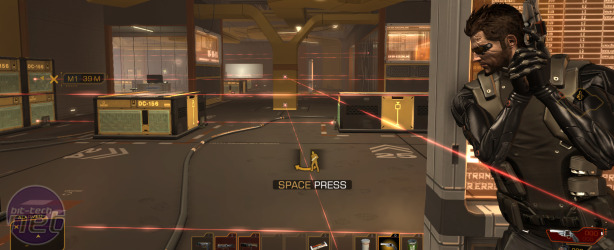
Deus Ex: Human Revolution
Publisher: Square-EnixPlatform: PC, Xbox 360, PlayStation 3
UK Price (as reviewed): £34.99 incl. VAT
US Price (as reviewed): $49.99 excl. Tax
We went into Human Revolution expecting one thing: bitter disappointment. After all these years of carrying a torch for the original Deus Ex... along with a pitchfork for Invisible War... how could this arrogant would-be prequel be anything but one of the PC's most beloved names wrapped up in a console friendly straitjacket and whored back onto the market? We were almost looking forward to unleashing some righteous fury.
A little over twenty hours and at least two missed meals later, we've rarely been so happy to be wrong. Human Revolution doesn't simply deserve to wear the Deus Ex name, but - for the most part - gets to do so with pride.
Human Revolution is a game that builds on its predecessor rather than being constrained by it, while still firmly respecting and fully embracing its spirit. With only a couple of exceptions, everything added feels like something that could have been in the original Deus Ex, had that game been built now instead of in 2000. At the same time, nothing major that was key to the experience back then has been removed. It's not as complete a revamp as Invisible War, but it's far more successful at being a Deus Ex game. For starters, we can say "Human Revolution" without wanting to spit.
The story takes place decades before the first Deus Ex game, at the critical point when cyborg body augmentations are hitting the mainstream and the world is divided over whether they promise humanity its ultimate upgrade, or to forever doom it to a soulless, mechanical future. You play Adam Jensen, gravel-voiced head of security for augmentation firm Sarif Industries, forced against his will into a full robotic makeover in the wake of a mysterious attack.
It's important to note that Adam is not... entirely happy about his upgrade. True, he's now a walking tank who can punch through walls and wear shades in the dark, but he's also right on the front-lines of a controversy that makes the stem cell debate look like a squabble. It's not long before the Deus Ex's main players realise that any man who can look this badass in a floral-pattern trenchcoat is worth getting to know. Adam gets drawn into things he never wanted to know existed.
Watch the Deus Ex: Human Revolution director's cut trailer
The basic structure is cribbed straight from the original Deus Ex, with two main hubs - Detroit and Shanghai -containing main missions that progress the story, and completely optional side ones for extra resources. These are fun in their own right, but mostly important because your hyper-rich boss never offers to pay your expenses, forcing you to constantly scavenge and buy ammo from the black market instead of just heading to the office supplies cupboard to tool up.
Both cities suffer from oddly low resolution textures and a little Painted Door Syndrome, but neither is honestly a huge problem. The excellent art design easily makes up for the former, and there's always something to discover just off the beaten track that makes you forgive the occasional irritating detour.
If there's one thing Human Revolution really excels at then it's in offering a believable sense of place, not just in the cyberpunk-renaissance aesthetic fusion, by also by presenting a world that feels really lived in. It's cluttered and messy, cramped without ever feeling claustrophobic, and constantly presenting a wonderful contrast as you step from the bright lights of some glassy corporate fortress into a corrupt, increasingly stratified society whose problems are only due to get worse before JC Denton shows up to (possibly) save the day.

MSI MPG Velox 100R Chassis Review
October 14 2021 | 15:04










Want to comment? Please log in.